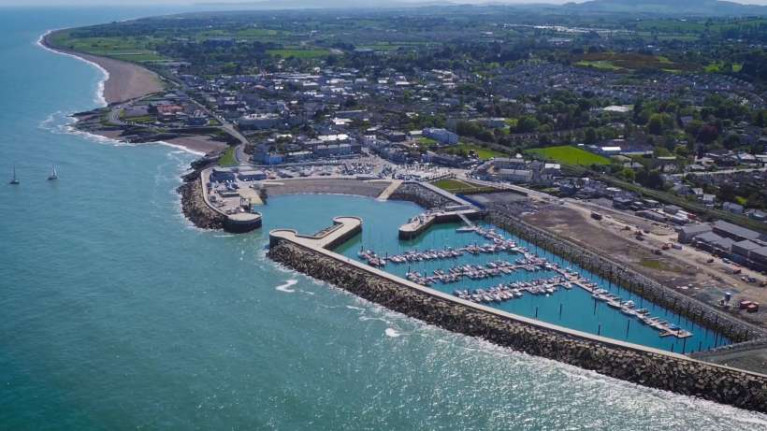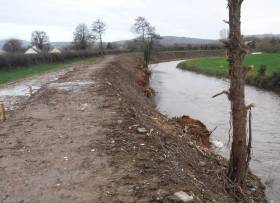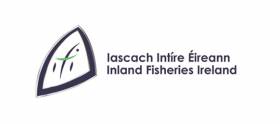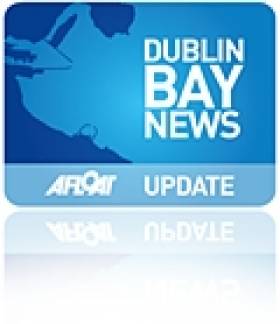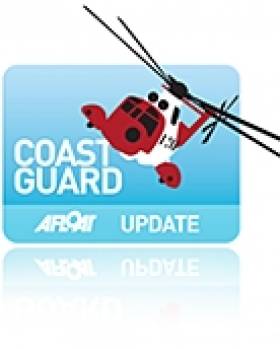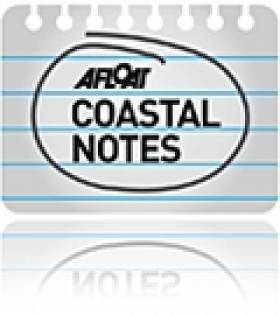Displaying items by tag: OPW
New Coastguard Station For Greystones Back On Agenda As OPW Lodges Planning Application
The Office of Public Works (OPW) has applied for planning permission for a new coastguard station in Greystones Harbour — three years after plans for the Co Wicklow town were deemed ‘not viable’.
Lack of funds was the reason given for previous proposals grinding to a halt after 12 years of discussions and planning, as reported on Afloat.ie in September 2016.
But now the project is back on the agenda as a planning application lodged recently with Wicklow County Council details revised plans for a single-storey boathouse and vehicle store with accompanying accommodation block.
The proposed building, to the north of Greystones Sailing Club, will have a combined floor area of 259 sq m and a maximum overall roof height of 7.8m above adjacent public space.
The planning application adds: “Proposals include high level windows and three roof lights; proposed external finishes comprise fair faced concrete, zinc roofing and metal framed windows, a new vehicular access point to the north east corner of the site, three flag poles, one radio aerial mast and entrance signage, provision of eight car parking spaces on hard landscaping, [and] associated site works.”
Submissions can be made until Sunday 23 February, and local planners are due to make their decision by Sunday 15 March.
OPW Flood Works On Limerick River Show ‘Disdain’ For Natural Heritage Claims Wildlife Group
The Office of Public Works has been accused of showing “disdain” for Ireland’s natural heritage over flood relief works on a waterway in Co Limerick.
The Irish Wildlife Trust (IWT) criticised the clearing last year of some 3km of wild habitat from the River Newport, east of Limerick city and within the Lower Shannon SAC.
The conservation group accuses the OPW of conducting the clearance works — in which “entire stretches of the riverbank had been stripped down to bare soil” — in the absence of the Appropriate Assessment legally required under Irish and EU law.
It is suggested these works have jeopardised an important habitat for otters and wet Willow woodland, while also potentially exacerbating the spread of invasive plan species such as Japanese knotweed and giant hogweed.
The IWT says it visited the River Newport in December and found that “works had greatly exceeded what had been set out” in the OPW’s initial screening report, which the group has branded “largely inaccurate”.
IWT campaigns officer Pádraic Fogarty said: “The OPW is not above the law but yet it seems to think that it can operate with impunity. The damage it has done to our rivers is incalculable; this instance at the Newport in Limerick is not untypical of the distain they show for our natural heritage.”
Similar complaints have been levied against OPW works in Skibbereen, where a stream feeding the River Ilen has been re-engineered as a concrete culvert.
This used to be a small stream feeding into the river Ilen in Skibbereen, home to masses of invertebrates, small trout and sticklebacks, otters and herons, bankside wildflowers, trees and vegetation. This is it after @opwireland finished with it. Absolutely criminal! pic.twitter.com/AEXqLm0oQW
— Ireland's Wildlife (@WildIreland) May 11, 2019
The OPW did not respond to queries from either The Sunday Times or The Green News.
Inland Fisheries Ireland & OPW Commit To Five-Year Working Agreement On Flood Risk Management
#Angling - Inland Fisheries Ireland (IFI) and the Office of Public Works (OPW) Flood Risk Management Unit have signed a new shared service agreement which will see them continue collaborate over the next five years in the protection of fishery requirements while carrying out flood risk management activities.
The agreement will see both parties work closely together to help ensure the country’s statutory drainage objectives are achieved, with a focus on the protection of fishery habitats and resources.
The OPW is the lead statutory body for drainage maintenance and flood risk management (FRM) in the State, while IFI is the statutory body responsible for the protection and conservation of the inland fisheries resource.
The agreement, which spans from 2018 until 2022, has been secured at a time when Government investment in flood risk management operations is increasing.
It follows the recent publication of the Government’s Flood Risk Management Plans which will see some €1 billion in funding under the National Development Plan invested in projects across the country to mitigate flood risk.
This new partnership formalises the historical working relationship between the IFI and the OPW and commits them to continuing their positive engagement for Ireland’s fishery habitats and resources.
Under the agreement, both parties will work across the Environmental River Enhancement Programme (EREP) and will focus on:
A series of scientific investigations to further understand environmental impacts of river maintenance works.
Development of best practice to minimise environmental impacts and maximise environmental gain of river maintenance and flood relief activities.
Work programmes to identify barriers to fish passage on arterially drained rivers that have potential for improvements works.
Work elements to assist achieving so that all waters will attain ‘Good’ ecological status by a specified date, as per the Water Framework Directive.
The aim is to provide a science-based platform to the IFI-OPW links. For example, scientific investigations will provide an evidence base for determining the appropriateness or otherwise of undertaking physical river enhancement works in locations to bring about improved Ecological Quality Ratio (EQR) scores.
Facilitated by IFI surveys, an EQR will be generated for the fish community and the physical form of the river at each site. This will inform all requests to OPW from third parties, such as angling clubs or community groups, to undertake such works. IFI will be taking a prioritised approach in undertaking surveys and could handle a small number of cases annually.
“We are delighted to re-engage with the OPW and continue to foster the high levels of understanding of fishery requirements within flood risk management activities while also ensuring statutory drainage objectives are realised. Together, we will secure the future of our rich natural fisheries resource,” said Suzanne Campion, IFI’s head of business development.
John Curtin, director of engineering services with the OPW, added: “This agreement is a proactive one in terms of delivering environmental gain, while still balancing the drainage/flood relief functions for our communities and demonstrates how two public authorities working in partnership can achieve more that the organisations could working individually.”
#PRESIDENT REOPENS MARITIME MUSEUM- President Michael D. Higgins officially performed the reopening ceremony of the €4m restored National Maritime Museum of Ireland in Dun Laoghaire today, reports Jehan Ashmore.
An ecumenical service was held by Canon Victor Stacey, Dean of St. Patrick's Cathedral Dublin, who up until recently was Minister at Christ Church & Mariners in Dun Laoghaire. The Dean was also joined by the town's Rev. Christopher Kennedy from the York Road Presbyterian Church and Mons. Dan O'Connor, Parish Priest of St. Michaels Church.
Follwing the blessing, the President spoke of his admiration for the beautiful building and of those many people over the years that helped to establish the Maritime Institute of Ireland (M.I.I.) and its museum through it many functions and role in the coastal town.
In particular the President paid tribute to the late Dr. John de Courcy Ireland, who was a prominent member of the M.I.I. and was made honorary research officer of the institute which was formed in 1941. It was in that same year that the President remarked was the year of his birth.
Following his speech a plaque to mark the occasion was unveiled by the President on the steps leading up to the altar of the apt venue of the former Old Mariners Church where more than 200 people witnessed the historic occasion. Those in attendance from the diplomatic corps included ambassadors from Argentina, Britain and France.
Among the other dignitaries where the Lord Mayor of Holyhead, local T.D's including Brian Hayes, Minister of State at the OPW which was ultimately responsible in the museum's renovation project. Funding came mostly from the Government, nationwide donations and volunteer-led collections.
The building project included major electrical and fire safety improvements, repairing stain-glass windows, and re-roofing. In addition repointing of the granite-cut building hewn from Dalkey granite which was built in 1836 for the Church of Ireland for mariners. The building is one of the last such structures still intact in the world.
Several years after the church closed in the early 1970' the Maritime Institute of Ireland moved into the building where the museum remained open until 2004.
Since then the building had undergone extensive renovation and modernisation. The museum which has been open to the public since April has exhibits from throughout Ireland and more will be added too in the future according to Peadar Ward, president of the M.I.I.. He added that they look forward to also displaying marine paintings and to hosting lecture programmes in the premises.
Also in attendance where crew members of the Naval Service L.E. Roisin (P51) which made a special port of call to Dun Laoghaire Harbour, berthing along the East Pier.
In addition members of the Irish Naval Association, the local RNLI lifeboat and sea scouts welcomed the President, where the day's events included a planting of an oak tree in the grounds of the building located close to the towns harbour waterfront.
'Following continuing contact with the OPW, it has been confirmed to me that a new contract for the construction of the new station has been awarded and work is to start very soon. This tender process has been ongoing for more than a year and I am delighted that it has finally been awarded and work to commence shortly.'
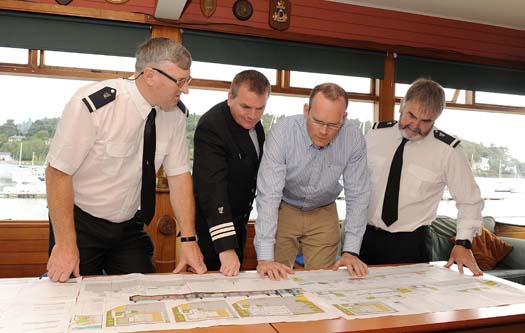
Marine Minister Simon Coveney TD with Victor Shine Deputy Area Officer Crosshaven Coast Guard Unit, Vincent Farr Area Officer and James Furlong Unit Member looking over the plans for the new €1.5 Million Coast Guard Station at Crosshaven, Co. Cork. The contract has been awarded to Blarney firm Cumnor Constuction Ltd and work will commence shortly. Photos Billy macGill
'Those who work at Crosshaven Coast Guard are to be commended for their commitment and dedication to the local community in a voluntary capacity. We must now ensure that they are working in a station that reflect this loyalty and high standard of service.'
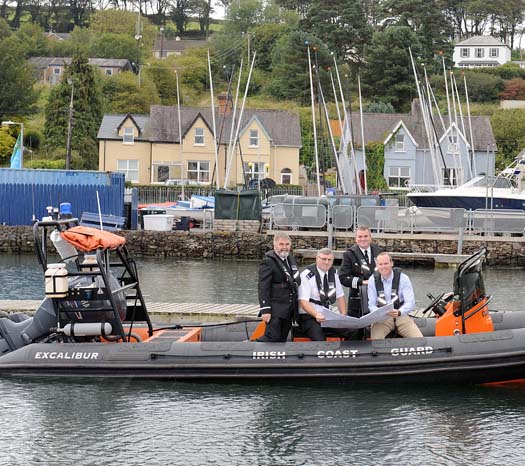
The contract has been awarded to Cumnor Construction Ltd. of Blarney on August 3rd. Work on the site is expected to commence very shortly.
St Brendan Voyagers Refused Access to Skellig
The crew of sailors, artists, musicians and historians on board Ar Seachrán - who are retracing the famous voyage of St Brendan - were refused permission to land on Skellig Michael, it has emerged.
The Kerryman reports that though some visitors are understood to have landed on the island in recent weeks, the OPW refused the Brendan's Voyage crew on health and safety grounds.
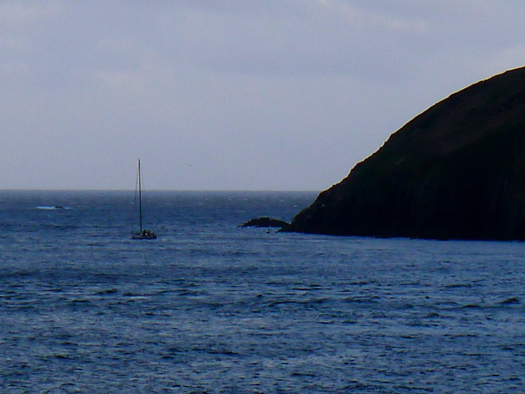
A spokesperson for the OPW said it requires at least 10 days notice to make preparations for any visitors and repair damage to pathways and buildings occurring over the winter months.
Dr Breandán Ó Ciobhán of the voyage party described the news as "very disappointing".
Ar Seachrán, a 45ft yacht owned by Paddy Barry - himself a veteran of unique ocean voyages - will continue on its journey up the west coast of Ireland and Scotland, by the Orkneys, Shetlands and Faroe Islands to Iceland.



























